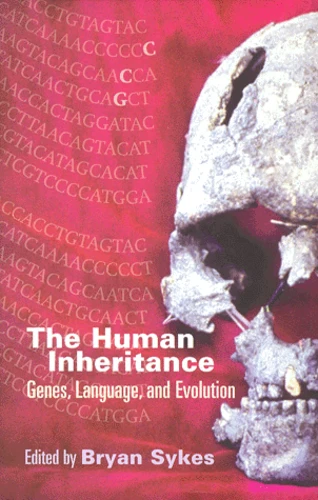The Human Inheritance. Genes, Language, And Evolution
Par : ,Formats :
- Paiement en ligne :
- Livraison à domicile ou en point Mondial Relay indisponible
- Retrait Click and Collect en magasin gratuit
- Réservation en ligne avec paiement en magasin :
- Indisponible pour réserver et payer en magasin
- Nombre de pages195
- PrésentationRelié
- Poids0.36 kg
- Dimensions14,5 cm × 22,3 cm × 1,7 cm
- ISBN0-19-850274-5
- EAN9780198502746
- Date de parution01/01/1999
- ÉditeurOxford University Press
Résumé
Very little excites human curiosity quite so much as contemplating human origins. More than any other branch of science, evolution-and human evolution in particular-is fraught with controversy. Working from what is essentially the same data, schools of opinion have come to diametrically opposed conclusions.
Are we adapted Neanderthals, or a new species altogether which wiped them out? Did the first Americans enter the continent 30,000 or 12,000 years ago? Did the Polynesians sail against wind and current to an unknown fate, or were they just blown across from South America while out fishing? Why do we speak different languages? Is it because language traces our biological history, or are the two things completely unrelated? Evolution, because it deals with a past that can never conclusively be known, was once ideal material for perpetual debate. Enter genetics with a completely new source of objective data. Surely these old questions would soon be settled one way or another. Or would they?
Bryan Sykes brings together a world-class set contributors to debate these questions. The result is eight lively essays, each of which offers a different opinion about what the links between genes, language, and the archaeological record can tell us about human evolution-and indeed, whether they can tell us anything at all. This stimulating and challenging book poses more questions than it offers eschews jargon, and pursues controversy. Guaranteed to fascinate anyone who has how the fossil record, the incredible diversity of human language, and our genetic inheritance might combine to give a glimpse of human origins.
Very little excites human curiosity quite so much as contemplating human origins. More than any other branch of science, evolution-and human evolution in particular-is fraught with controversy. Working from what is essentially the same data, schools of opinion have come to diametrically opposed conclusions.
Are we adapted Neanderthals, or a new species altogether which wiped them out? Did the first Americans enter the continent 30,000 or 12,000 years ago? Did the Polynesians sail against wind and current to an unknown fate, or were they just blown across from South America while out fishing? Why do we speak different languages? Is it because language traces our biological history, or are the two things completely unrelated? Evolution, because it deals with a past that can never conclusively be known, was once ideal material for perpetual debate. Enter genetics with a completely new source of objective data. Surely these old questions would soon be settled one way or another. Or would they?
Bryan Sykes brings together a world-class set contributors to debate these questions. The result is eight lively essays, each of which offers a different opinion about what the links between genes, language, and the archaeological record can tell us about human evolution-and indeed, whether they can tell us anything at all. This stimulating and challenging book poses more questions than it offers eschews jargon, and pursues controversy. Guaranteed to fascinate anyone who has how the fossil record, the incredible diversity of human language, and our genetic inheritance might combine to give a glimpse of human origins.




